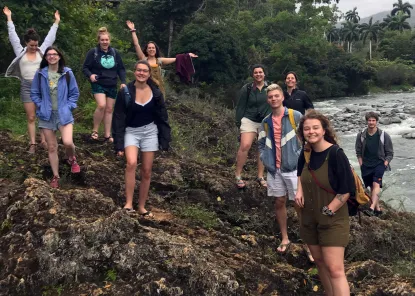
Program Overview
The Environmental Studies and Sustainability (ENSS) major at NMU trains and educates students to observe, measure, and influence how people interact with Earth’s natural and cultural environments. This produces knowledge that is helpful in understanding our changing world and ensures its sustainability through the implementation of holistic solutions. Students will learn about sustainable food systems, energy, water resources, demographic changes, culture, and the built environment.
Our faculty train students to identify geographic concepts and patterns, and to use spatial, qualitative, and quantitative methods to understand and address environmental challenges.
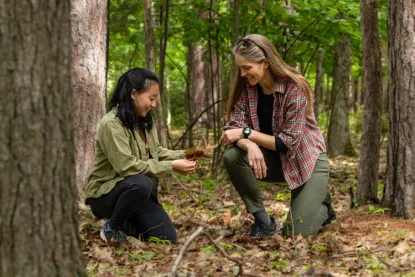
Learning Objectives
- Identify key concepts and geographic patterns such as population growth, resource utilization, energy, agriculture, migration, and urbanization, and how these concepts apply to different locations around the world.
- Explain the connections between ecological, economic, and social systems, and basic properties of each of these systems.
- Explain how different cultures and political institutions have influenced environmental and sustainability issues, and how different groups affect, and are affected by, environmental problems.
- Assess and address sustainability challenges and communicate social and environmental problems through reports, presentations, collaborations, and partnerships.
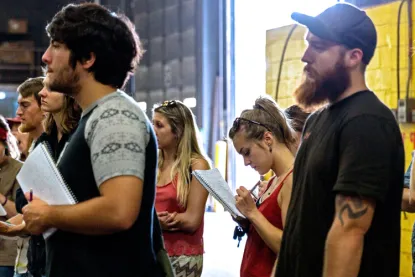
Skills and Competencies
The Environmental Studies and Sustainability major’s course work will develop critical thinking, problem solving, and decision-making abilities. Strong communication skills, including writing and speaking, are essential for a career in this field. Leadership skills are also beneficial.

What can you do with an Environmental Studies and Sustainability degree?
This program helps students prepare for employment in many careers including, but not limited to, the following:
- Conservation/Restoration Technician
- Ecotourism Guide
- Environmental Conservation Officer
- Environmental Consultant
- Environmental Educator
- Environmental Policy Expert
- Environmental Protection Specialist
- Organic Farmer
- Park Naturalist
- Park Ranger
- Recreational Consultant
- Resort Manager
- Sustainability Coordinator
- Sustainable Agriculture Practitioner
- Transportation Planner
- Urban Planner
- Water Conservationist
Affiliated Faculty

Jelili "Gana" Adebiyi
Assistant Professor
jadebiyi@nmu.edu 906-227-2634Office Location:
3003 Weston Hall
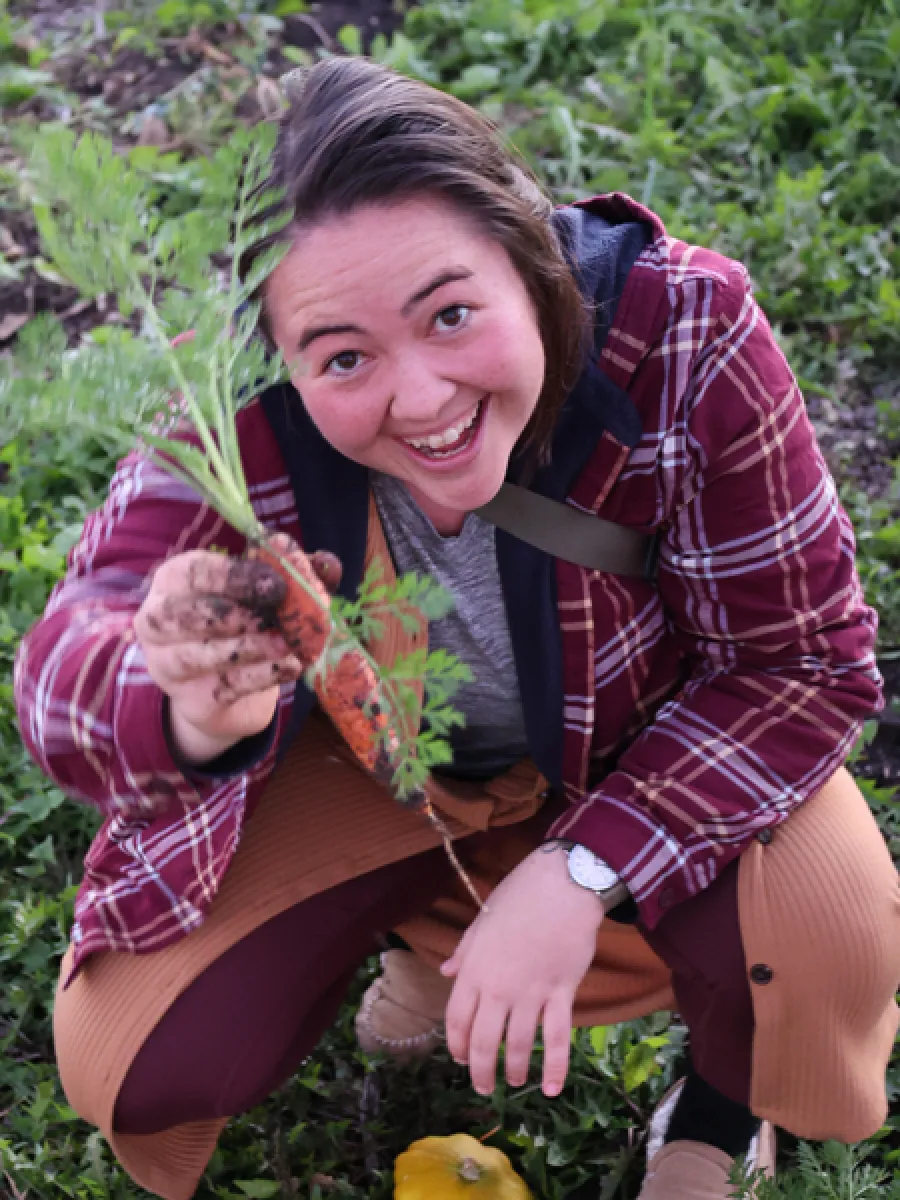
Kathleen Henry
Contingent Instructor
khenry@nmu.edu 906-227-2500Office Location:
3109 Weston Hall
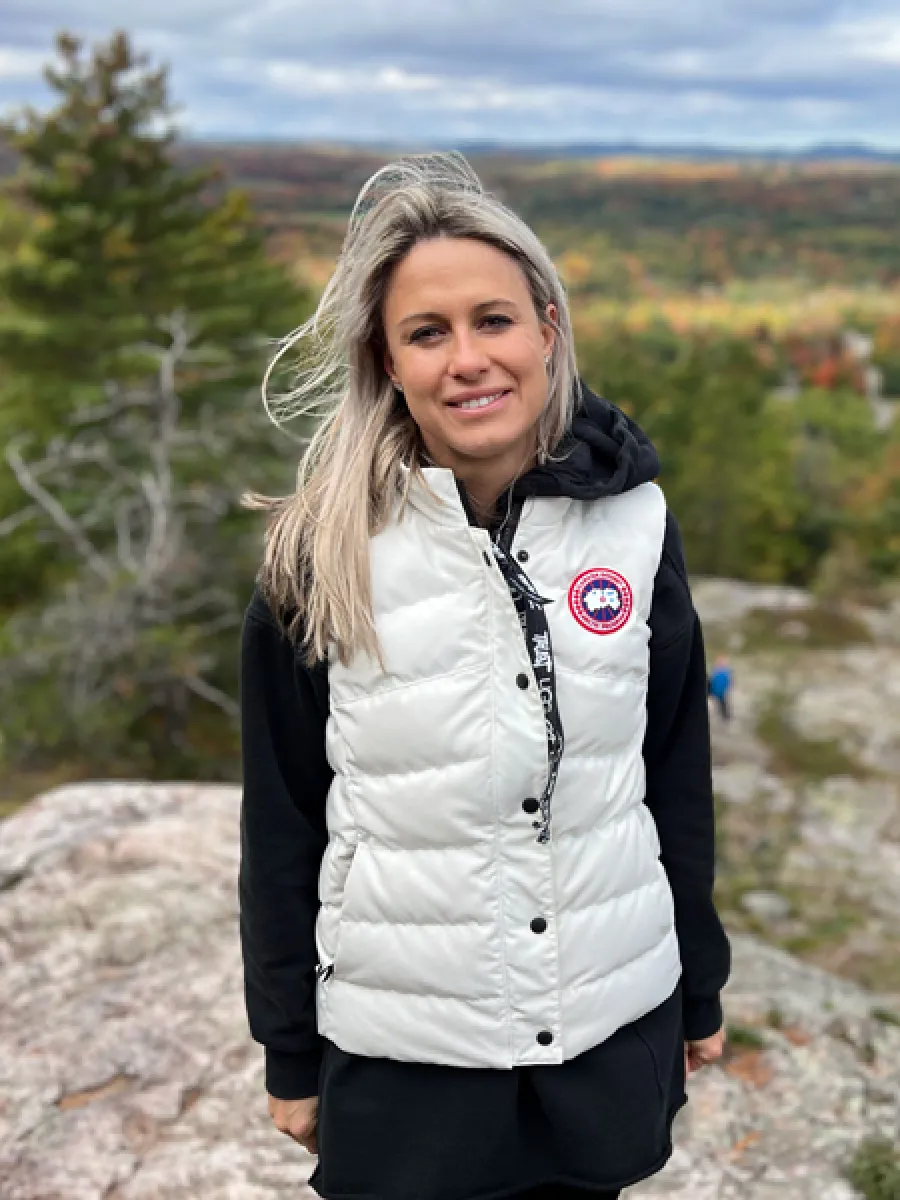
Weronika Kusek
Associate Professor, Provost Fellow, and Graduate Program Director
wkusek@nmu.edu 906-227-2989Office Location:
3111 Weston Hall

Sarah Mittlefehldt
Professor, Interim Department Head
smittlef@nmu.edu 906-227-1442Office Location:
3005/3001A Weston Hall

Ryan Stock
Assistant Professor
rystock@nmu.edu 906-227-2616Office Location:
3115 Weston Hall

Susy Ziegler
Professor, Interim Dean of the College of Graduate Studies & Research
suziegle@nmu.edu 906-227-1104Office Location:
401B Cohodas Hall
Environmental Studies and Sustainability Major Requirements
Environmental Studies and Sustainability Core 50 Credits
- GC 100 - Physical Geography [SCII] 4 Credits
- GC 101 - Introduction to Environmental Science [INTT] 4 Credits
- GC 164 - Human Geography [SOCR] [GCIT] 4 Credits
- GC 205 - Introduction to Geographic Research 4 Credits
- GC 220 - Economic Geography 4 Credits
- GC 225 - Introduction to Maps 2 Credits
- GC 235 - Quantitative Methods 4 Credits
- GC 269 - Introduction to Sustainability 4 Credits
- GC 310 - Urban Geography 4 Credits
- GC 320 - Environmental Policy and Regulation 4 Credits
- GC 335 - Geographic Information Systems 4 Credits
- GC 360 - Population Geography [PERS] 4 Credits
- GC 489 - Human-Environment Capstone 4 Credits
Environmental Studies and Sustainability Electives 8 Credits
Choose 8 credits from the following:
- AN 320 - Native Peoples of North America [GCIT] 4 Credits
- COM 432 - Environmental Communication 4 Credits
- EC 345 - Environmental and Natural Resource Economics 4 Credits
- EC 425 - International Economics 4 Credits
- EC 460 - Economic Development 4 Credits
- GC 202 - Soils 4 Credits
- GC 210 - Earth Hazards [SCII] 4 Credits
- GC 285 - Earth’s Climate: Past, Present, and Future 4 Credits
- GC 303 - Practicing Geography 4 Credits
- GC 316 - Geography of Tourism 4 Credits
- GC 317 - Geography of Food Systems 4 Credits
- GC 342 - Energy and the Environment 4 Credits
- GC 362 - Wetlands 4 Credits
- GC 424 - Environmental Justice 4 Credits
- GC 431 - Landscape Dynamics and Analysis 4 Credits
- GC 444 - Gender and Environment 4 Credits or
- GN 444 - Gender and Environment 4 Credits
- GC 470 - Environmental Ethics 4 Credits
- GC 475 - Environmental Impact Assessment 4 Credits
- GC 491 - Internship 2-6 Credits
- NAS 340 - Kinomaage: Earth Shows Us the Way 4 Credits
- NAS 342 - Indigenous Environmental Movements [INTT] [GCIT] 4 Credits
- PS 206 - International Relations 4 Credits
- PS 415 - Politics of American Foreign Policy 4 Credits
- SO 351 - Social Change [PERS] 4 Credits
- GC 300 - Regional Studies: World Cultures [SOCR] [GCIT] 4 Credits or
- Study Abroad 4 Credits*
Notes:
*Study abroad may be substituted for GC 300 with advisor approval.
This major does not require a minor.

Where Have Our Students Interned?
The following is a partial listing of organizations and businesses where our have interned.
- Borden Dairy—sustainability intern
- Citizens' Climate Lobby
- Great Lakes Climate Corps—crew member; crew leader
- Eaton County Resource Recovery Department—resource recovery intern
- Isle Royale National Park—camping impacts monitoring intern
- Marquette Alternative High School—garden educator
- Marquette County Climate Adaptation Task Force
- Marquette County Planning Department—planning assistant
- Marquette County Solid Waste Management Authority—various internship opportunities
- Michigan Energy Options
- Michigan Environmental Council
- Montana Department of Natural Resources and Conservation—wildland firefighting
- NMU EcoReps—various positions
- Partridge Creek Farm—various intern positions
- Seaside Sustainability
- Sierra Club
- Superior Watershed Partnership—various internships including for Energy Conservation Corps, technical writing, ecosystem restoration
- Valley Stewardship Network
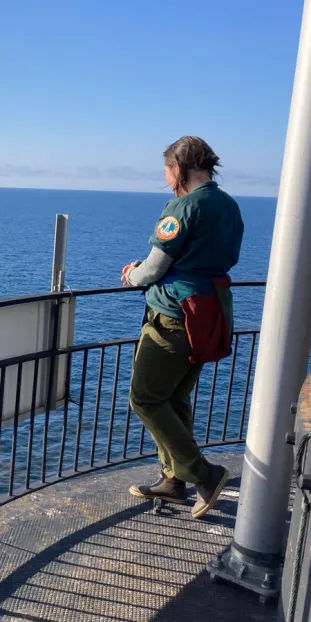


Declare the ENSS Major
We strongly encourage you to meet with one of our Senior Success Advisors in EEGS before declaring the major, as they can provide valuable guidance and will work with you to develop a degree plan. Our Success Advisors are:
- Ruth Abbott (rabbott@nmu.edu; schedule a meeting)
- Lauren Anargyros (lanargyr@nmu.edu; schedule a meeting)
- Jennifer Mital (jmital@nmu.edu; schedule a meeting)
- Susan Robison (surobison@nmu.edu; schedule a meeting)
When you are ready to declare:
- You may submit your request to change a major or a minor on the web on the Change or Declare a Major page.
- Enter your name, NMU IN, email address, class standing, check the "change my major" box, and input any additional relevant comments.
- Submit the declare request.
You may also visit the Student Success Office in 3302 C.B. Hedgcock Building to make the change in person.
